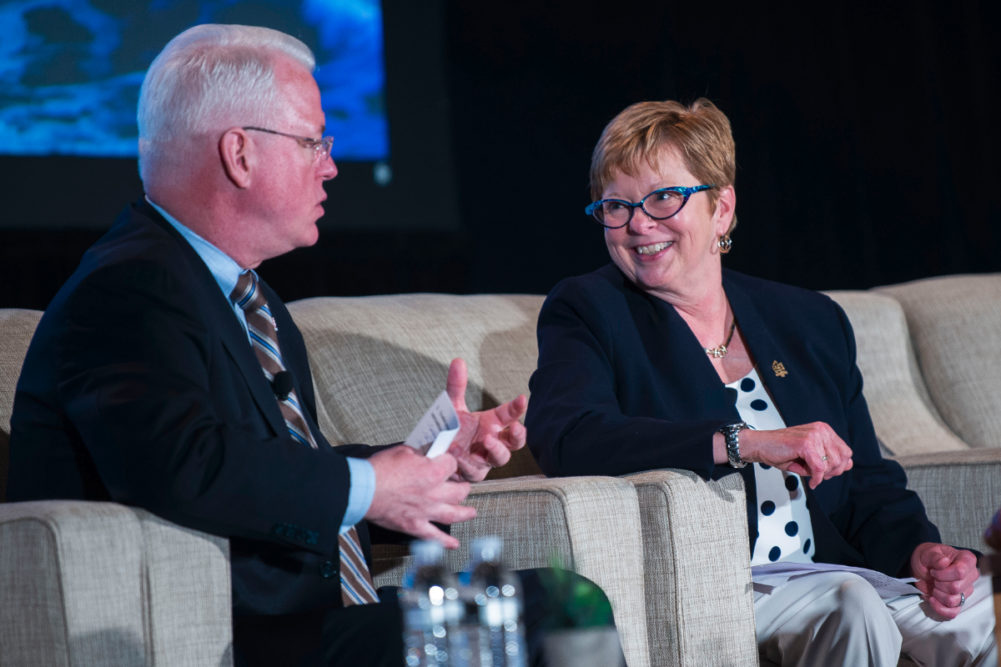NAPLES, FLA. — A focused approach to the agenda of the American Bakers Association has paid dividends, said Erin S. Sharp, A.B.A. chairman and group vice-president, manufacturing, The Kroger Co., Cincinnati.
In a discussion with Robb MacKie, president and chief executive officer of the A.B.A., Ms. Sharp offered her perspective on how membership in the A.B.A. benefits a large company like Kroger that is not principally engaged in baking. The dialogue was part of the all-members meeting during the A.B.A. annual meeting April 7-10 at The Ritz-Carlton hotel, Naples.
She credited the A.B.A. with “instead of being a mile wide and an inch deep, to really narrow the focus.”
“Getting alignment with the biggest issues of the industry has been key, and I think there has been a lot of emphasis on getting feedback to make sure those priorities were the right ones,” she said. “And I think the work in addressing government overreach has been a key part of our work on the hill.”
Several of Mr. MacKie’s questions probed Ms. Sharp’s perspective as a “non-traditional baker” about the A.B.A. and its activities. One of the largest retailers in the United States, Kroger also operates a number of manufacturing facilities, including baking and dairy plants. Responding to Mr. MacKie, she described a complementary relationship between the regulatory affairs staff of Kroger and the A.B.A. team.
“As a large organization, we do have some government relations folks in Washington,” she said. “We have a small group and an extension in Cincinnati. The relationship that team and our work in A.B.A. has, it allows our government relations team to focus on the things that are unique to Kroger, knowing we have the food manufacturing space, particularly the baking area (but there is a lot of overlap into other food manufacturing areas) covered with the work A.B.A. does. We’ve really focused on building the partnership with our government relations team and A.B.A.’s team.”
Benefits Kroger gains from attending the International Baking Industry Exposition every three years mirror those she experienced while in the baking industry, Ms. Sharp said.
“We have leveraged IBIE each cycle, and even earlier in my career when I was with Sara Lee, as an opportunity to bring leaders across the organization together,” she said. “So what we do is all the site leaders who run our bakeries and teams that support the bakeries from an engineering or a quality R.&D. standpoint, we walk the show together. We come at it with a set of objectives. We take advantage of the educational program. It’s outstanding.
“This year, by having a separate day to allow folks to really pick and choose and get to as many sessions as they can is going to be outstanding. Taking the opportunity to put the right folks in the right sessions and coming with specific objectives around whether it’s capital needs for that year, or the coming years as well as product formulations you have or safety challenges, and look for specific solutions as you walk the floor.
“We make a habit of coming together as a team to talk about what everyone has seen. Members of the team know that if they see something that might have applicability across the network, other than the individual’s own plant, to bring that back to the broader team, and we oftentimes double back to see things others have recommended. It’s a great experience.”
Finding ways to help Kroger offer products with clean labels will be an objective at IBIE this year, she said.
“(We will be) looking for ingredient solutions that help us or give a cleaner label to our customers,” she said. “Sustainability is a huge focus for Kroger as a corporation. Our manufacturing team has really led the work with zero waste. Its energy reduction, waste stream reduction, those are the things that are important to our team.”
The first woman to be elected chair of the A.B.A., Ms. Sharp said she always has felt comfortable in what has been a male-dominated industry — food manufacturing. Asked for advice to offer women who have entered the field, she encouraged up-and-comers to be their true selves.
“Don’t try to be someone you are not,” she said. “And leverage the uniqueness we bring as women leaders. I’ve always found as I’ve grown in my career is looking for those right mentors in your career is absolutely critical. Whether they are male or female doesn’t matter. You really want to find someone who can open doors for you. And I don’t mean hand things to you, because at the end of the day we’re all responsible for our own careers, but at least to try to remove obstacles for you. Then it’s up to you to take advantage of those relationships. To ask questions, to ask for help. I just made a point to never turn down a request to be a mentor. For those of you seasoned leaders, open yourself up to be mentors. Those relationships are absolutely critical for success. As organizations flatten and get leaner, opportunities to grow become fewer and farther between. It’s really important to have those relationships that can help you in that career.”






